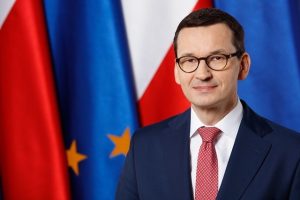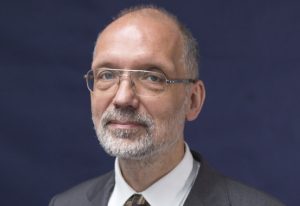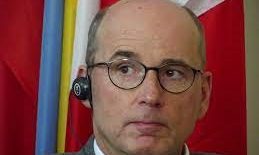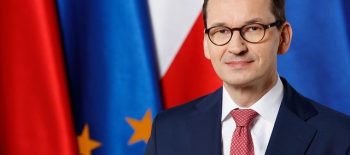1. Mateusz Morawiecki: Five Lessons Following One Year of War
2. Prof. Piotr Gliński: Poland. Always on the Side of Freedom
3. Prof. Andrzej Nowak: Die Ukraine oder der Widerstand gegen die imperiale Versklavung
1. Mateusz Morawiecki: Five Lessons Following One Year of War

Mateusz Morawiecki © INM
We must do everything to ensure that this greatest geopolitical nightmare of the 21st century is finally over.
Precisely one year ago, on 24 February 2022, Russia launched its military assault against Ukraine, shattering the order established after the Cold War. The security and prosperity achieved through the efforts of whole generations of Europeans were on the brink of crumbling down. Russia has embarked on its imperial conquest with a single goal in mind: reconstruct the former Soviet sphere of influence regardless of the related costs and victims. We must do everything in our power to put a stop to that most terrible geopolitical nightmare of the 21st century.
What is the state of play? We have seen twelve months of Russia’s unheard-of cruelty. The months were measured out by regular bombings of schools, hospitals and civilian buildings. They were counted not by days, but by the number of victims. The Russians have spared no one, killing men, women, old people and children. The acts of genocide in Bucha, Irpin and other towns provide chilling evidence that Russia has committed the most horrendous crimes. Mass graves, torture chambers, rapes and abductions – this is the true face of Russian aggression.
But it has also been a year of the great heroism of the Ukrainian nation led by Volodymyr Zelensky, a nation that has stood up to Russia’s evil empire. A year of faith, perseverance and determination. Ukraine is fighting not only for its own sovereignty, but also the security of the entire continent.
How do we stop this war? The last year has taught us many important lessons that the Western countries should take to heart if they really want to live in peace and security.
Lesson 1. The war concerns us all
We need to start by getting rid of a false image of the Russian invasion. This is not a local conflict. Russia tries to set Europe ablaze. Its aim is to destabilise the entire global economic order.
The aggression against Ukraine is part of a plan that was hatched a long time ago and has been implemented by Putin for at least a decade. As early as 2008, during Russia’s invasion of Georgia, President Lech Kaczyński gave this warning: “We know perfectly well that, today, it is Georgia that is at stake, tomorrow it can be Ukraine, the day after the Baltic states and then maybe my own country, Poland”. These words came true sooner than Europe had expected. Six years later, in 2014, Russia annexed Crimea. Today, we are all witnessing a full-scale military attack against Ukraine. What will the future hold if we do not stop the Russian war machine?
From a distance of hundreds of kilometres one cannot hear the sound of exploding shells, air-raid sirens or the crying of parents who have just lost their loved child in a bombing. But the distance from Kiev must not be used to appease our conscience. I am sometimes afraid that the West is indeed populated by many for whom having a lunch in a favourite caffe or watching a Netflix series is more important than the lives and deaths of thousands of Ukrainians. We can all see the war happening. No one will be able to claim that they did not know about the genocide in Bucha. We are all watching the atrocities being committed by the Russian army. This is why we must not be indifferent. Russia’s imperial plans go beyond Ukraine. This war concerns us all.
Lesson 2. Russia fuels the global economic crisis
The war in Ukraine is only one of the fronts on which the battle for the future of Europe is fought. Russia is also attacking our civilisation in the areas of cyberspace, information and the economy. Carl von Clausewitz once said that war is a continuation of politics by other means. Apparently, Vladimir Putin has understood that famous adage very well. Moscow adapts the techniques of aggression to the adversary it faces. Putin cannot conquer Europe militarily, before he destroys its economy.
The energy crisis and global inflation we are all grappling with have their origin in Russia’s imperial aggression. The precursor to the invasion of Ukraine was the Kremlin’s hawkish gas policy back in July and August 2021. At the time, Putin’s gas blackmail led to hikes in gas prices on European markets. This was just the beginning.
Russia hoped that the paralysis of the energy sector would weaken European countries and convince them to stay well away from the war in Ukraine. Right from the outset, the strategy employed against the West was to escalate the crisis. Russian military activity is one of the main reasons for rising global prices. We are all paying dearly for the decisions taken in the Kremlin. It is time we understood that the global economic crisis is fuelled by Russia.
Lesson 3. De-Putinisation is a prerequisite for Europe’s sovereignty
For several years now, the weakness of the West has been Russia’s strength. Dependence on Russian hydrocarbons, dubious dealings with Russian oligarchs and the utterly incomprehensible concessions that Europe made, including those concerning the construction of the Nord Stream 2 pipeline – all that paints a picture of pathological relations between the West and Russia. Many European governments believed they could conclude perfectly normal contracts with Moscow. In fact, the contracts turned out to be pacts with the Devil where Europe’s soul was at stake.
This is why going back to “business as usual” is impossible. One cannot normalise relations with a criminal regime. It is high time Europe became independent of Russia, especially in the energy sector. Poland has long stressed the need to diversify the supplies of oil and gas. New sources of these products open up new opportunities. De-Putinisation, i.e. breaking off relations with the dictatorial machine of violence created by Putin, is a sine qua non for Europe’s sovereignty.
Lesson 4. Solidarity is stronger than fear
The war has already changed Europe. Invading Ukraine, Russia hoped that the West would not wake up from the geopolitical slumber into which it fell years ago when it naïvely believed in the “end of history” myth. Russia has miscalculated. It wanted to divide us, but we became more united than ever before.
Like with any other totalitarian regime, the most powerful weapon of the Kremlin is fear. We must counter Russian threats and blackmail with solidarity. Help for Ukraine is already coming from all corners of the world in the form of food, supplies and weapons. What we are giving Ukraine is hope and a chance of victory.
Germany’s approval to send the Leopard tanks to Ukraine – an approval Poland called for – is of great importance here. We know already that the German-produced vehicles will be accompanied by American Abrams tanks. In the end, cold calculations were put aside in favour of the Euro-Atlantic raison d’etat. NATO has proved that besides being the most powerful military alliance in the world, it also stands truly united. Together we shall overcome evil. Solidary is stronger than fear.
Lesson 5. Rebuild Ukraine and strengthen Europe
The victory in the fight against Russia is closer not only thanks to the successes of the Ukrainian army, but also because the Russian bear has been weakened by sanctions. We owe this to the West, which has formed a strong alliance for freedom. However, defeating Russia in the present struggle is not enough. In order to win the war, we need to build an entirely new security structure both politically and economically.
What will be the building blocks of our common European home? Security is the fruit of unity grounded in shared values and interests and consolidated by strong economic and social ties. We will not come out of the economic crisis with the conflagration of war at Europe’s doorstep.
We are facing two scenarios of Europe’s future. Either Ukraine wins and there is peace in the continent, or the winner is Russia and Putin’s imperialism is free to expand. If Ukraine is to come out victorious, we need to start thinking about a paradigm shift in European politics even today. The idea of a community of security and peace is now the only possible development model.
Exactly one year after the outbreak of the war, we have one common goal to be pursued in solidarity: rebuild Ukraine and strengthen Europe.
Mateusz Morawiecki
Prime Minister of the Republic of Poland, member of the team who negotiated the conditions on which Poland joined the EU, graduate in History from the University of Wrocław and Business Administration from Wrocław University of Science and Technology and Central Connecticut State University
2. Prof. Piotr Gliński: Poland. Always on the Side of Freedom

Prof. Piotr Gliński © INM
At the end of last February, the media ran pictures of Polish borders, railway stations, cities, towns, and roads that showed waves of war-stricken Ukrainians – women, children, and old people – flowing into our country. The Poles opened their homes to them; volunteers, community workers, representatives of NGOs, officials at local and central levels and Polish services worked day and night; businessmen and regular citizens supported the refugees, organising aid, accommodation, food, care, and work. The world looked on in disbelief.
This should come as no surprise, given that the world did not know about Polish history. It did not know that the Poles value most of all freedom and a sense of community and that, in the face of unprecedented criminal aggression against the country with which we share some past grievances, solidarity in defence of those values comes first. This attitude has been the hallmark of the Polish culture for generations. Very early on in its development, the Polish identity was formed in step with an understanding of commonality and freedom. The latter was the foundation of social institutions that emerged to protect civic freedoms and respect human dignity.
From the days of Paweł Włodkowic and the 15th-century Council of Constance, the Poles have been well aware that freedom grows through interdependence. Deterministic ideas and restrictions were looked at askance. Freedom of conscience was sacred. The Commonwealth was inspired by Roman republicanism from which it adopted the notion of freedom from domination as a prerequisite for political life, the importance of tradition, the freedom to choose and decide, the feeling of what is right, and a sense of duty towards the community of free people. The republican and freedom-loving spirit was part and parcel of the Polish genotype. The Constitution of 3 May 1791 went down in history a great act of liberty. Its opponents claimed obsolete freedoms and chose despotism that eventually destroyed the carved-out space of freedom.
For 123 years, between late 18th-century and 1918, Poland was deprived of its statehood and sovereignty, relying primarily on the community of ideas, traditions, culture, and language. Attempts to restore independence were present in the tradition of Polish Positivism and insurrections. Our national mentality was shaped by the propensity to offer armed resistance to violence. In the 20th century, this manifested in the WW1 push for independence, redeeming lost territories (1918-21), hampering the progress of Bolshevism (1920), and combatting the Third Reich (1939). The “dream of freedom” continued in the Polish collective conscience. Then came the baptism of fire in the form of socialist realism that shattered social structures based on national values and the primacy of the family, triggered mass migrations, and negated human subjectivity. But not even that could suppress the drive for freedom (1980, 1989). In the light of all this, it becomes obvious why the Poles have so much understanding for the continued need to defend freedom and the right to self-determination.
The cultural and civilisational clash that the world could see so clearly during the Russian onslaught on Ukraine is also rooted in history. When the peripheral 15th-century Moscow decided to extend its dominion onto the former Ruthenia, its dispute with the Commonwealth over the territories of today’s Belarus and Ukraine went beyond political affiliation to include religious, civilisational, and ethnic identity. The Polish experiment of a political union with Lithuania showcased a political culture steeped in the ideas of participation and civic freedoms. Moscow, on the other hand, was already then running a radically different political system based on geographic expansion and the enforcement of political, military, and economic domination. Right from the outset, this supremacy was considered to be a threat to the existence of the Commonwealth, and very rightly so. The Polish political thought countered those imperial aspirations with the ideas of national self-determination which became the mainstay of the Polish anti-imperial eastern policy.
After regaining independence in 1918, Poland pursued its foreign policy based on the doctrine of the Intermarium, whose roots went back to the multicultural Polish-Lithuanian Commonwealth, a doctrine that called for an alliance of CEE countries to avoid the domination of Russia or Germany. It was premised on the solidarity and cooperation of all participating states, defence of sovereignty, development of subjectivity, and the pursuit of shared interests of CEE countries inspired by Poland. Following 1945, the concept was picked up by Polish emigrants (Polish Independence League) and members of the opposition in the Polish People’s Republic.
When it got back its autonomy, Poland seemed too weak in terms of its resources, mentality, economy, and political clout to be the leader of change in the region, but it still had that sense of experience and duty stemming from history, geopolitics, neighbourhood relations, and an awareness of raison d’etat. Meanwhile, disappointed by the results of its rapprochement with the West, Russia kept forging a separate identity and resurrecting imperial ambitions. Under the new circumstances, Poland felt that it virtually had an obligation to get involved in the East. A person that featured prominently in the pantheon the Polish eastern policy at that time was Lech Kaczyński, a practitioner of the anti-imperial doctrine developed through a long tradition of thinking about Poland’s place in the world. The doctrine says that imperialism is a threat to peace, and the strategic interests of Poland include freedom, sovereignty and independence for our eastern neighbours.
But let us go back to history and values. The Poles have protected the European civilisation from the eastern menace on many occasions, acting as the bulwark of Christianity. Such was the case in the 13th (Legnica 1241), 17th (Vienna 1683), and 20th (Warsaw 1920) centuries. During the great war with the Teutonic Order (1409-11), they fought for a civilisation of solidarity, freedom and human dignity. At the Battle of Grunwald, the Poles, Lithuanians and Ruthenians defended their right to self-determination. At the end of the early modern period, it was believed that “Poland is wherever freedom is defended.” On 25 January 1831, the demonstration in Warsaw featured the following motto: “In the name of God for our freedom and yours.“ It became the national motto of the Poles, a nation that, like none other, can relate to those who are ready to pay the highest price for their freedom.
During WW2, from the September Campaign to Berlin, “where there was the enemy, there were also the Poles,” fighting in the resistance units, on the seas and oceans and in the air. They then challenged the Soviet-imposed communist regime. It was Solidarity – that quintessentially Polish phenomenon, a freedom movement merging insurrection, civic and worker rights, postmodernism, religion, morality, revolution and social issues – that initiated the victorious process of dismantling the Soviet domination in Central and Eastern Europe.
Yes, the Poles treat solidary and the love of freedom not as an empty catchphrase, but a geopolitical concept that is one of the pillars of their foreign policy. It is not only a source of pride, but also a duty. To prevent the defeat of Ukraine, we need to pool our efforts and act in solidarity. Poland shall not give up this struggle and will always stand in solidarity to defend freedom.
Prof. Piotr Gliński
Professor of Humanities, Deputy Prime Minister, Minister of Culture and National Heritage, in 2005–2011 President of the Polish Sociological Association, has cooperated with the Institute of Philosophy and Sociology, Polish Academy of Sciences, in 1997–2005 Head of the Civic Society Department
3. Prof. Andrzej Nowak: Die Ukraine oder der Widerstand gegen die imperiale Versklavung

Prof. Andrzej Nowak © INM
Katharina II., von der Angela Merkel so fasziniert ist, löste gewaltsam die Sitsch auf – den letzten Hort der Selbstverwaltung der freien Kosaken unter ihrer Herrschaft, das letzte Überbleibsel der politischen Tradition der Ukraine.
Die Bundeskanzlerin Merkel hat Russland immer wieder als „unseren großen Nachbarn“ bezeichnet, ebenso wie ein nicht geringer Teil der heutigen deutschen Medienlandschaft. Wenn man allerdings die gegenwärtige Landkarte Europas betrachtet, muss man zugeben, dass Russland nicht der Nachbar Deutschlands ist. Dazwischen gibt es noch Länder wie Polen, die Ukraine, Litauen, Belarus … Auf dem Schreibtisch der Kanzlerin stand ein Porträt von Katharina II., der Zarin von Allrussland, einer Deutschen, die als die hervorragendste Herrscherin auf dem russischen Thron gilt. Sie tat dies, wahrscheinlich um ein Beispiel für den Erfolg einer Frau in der großen Politik zu vergegenwärtigen, zudem einer, die aus Ostdeutschland (konkret: aus Stettin) stammte.
Irgendwo ging jedoch ein kleiner Pinselstrich in diesem Porträt verloren: Katharina verdiente sich in Russland den Beinamen „die Große“, weil sie die erfolgreichste Westexpansion ihres Reiches im gesamten 18. Jahrhundert durchführte: Sie besetzte die Nordküste des Schwarzen Meeres, die sie „Noworossija“ nannte, und beseitigte den riesigen polnischen Staat, der über acht Jahrhunderte lang bestanden, seit dem 14. Jahrhundert in freiwilliger Union mit Litauen existiert und auch die Gebiete des heutigen Belarus und der Ukraine umfasst hatte. Alexander Puschkin, der großartigste Lobredner des Russischen Imperiums (neben Josif Brodski, der die Ukraine hasste und Fjodor Dostojewski, der Polen und den Westen hasste), stellte fest, dass es eben diese geopolitische Leistung war, die Katharinas wichtigsten Titel für unsterblichen Ruhm darstellte. In seiner privaten und daher aufrichtigen Notiz erinnerte der Dichter ebenfalls daran, dass Katharina auch eine erfolgreiche Expansion in Richtung Norden vorbereitet hatte: die Eroberung Finnlands, die schließlich von ihrem Enkel, Zar Alexander I., durchgeführt werden sollte.
Das aufgeklärte Europa bewunderte Katharina, weil sie nicht nur in der Lage war, Nachbarländer zu erobern, sondern auch die „Trendsetter“ der damaligen öffentlichen Meinung zu kaufen: Voltaire, Diderot, in deutschen Landen den Baron Grimm. Und sie redeten Europa ein, dass die von Katharina eroberten Gebiete nichts anderes als eine Quelle des Chaos, der Anarchie und der Rückständigkeit auf der Landkarte des aufgeklärten Europas seien, wo östlich von Deutschland nur Russland und seine Modernisierung zählen sollten. Eroberung als Modernisierung … Wir sollten hier hinzufügen, dass Katharina im Namen der „Modernisierung“ auch die Sitsch gewaltsam beseitigte – den letzten Hort der Selbstverwaltung der freien Kosaken unter ihrer Herrschaft, das letzte Überbleibsel der politischen Tradition der Ukraine.
Doch woher kam diese Ukraine, die Katharina von der Landkarte und aus dem Gedächtnis streichen wollte, ebenso wie Polen? Die Ukraine, Belarus und Russland haben eine gemeinsame Wiege: die Kiewer Rus. Diese gemeinsame Wiege der ostslawischen Staatlichkeit fiel jedoch im 13. Jahrhundert infolge der Invasion der Mongolen auseinander. Sie wurde anschließend zwischen politische Systeme aufgeteilt, die neue Zentren errichteten: Moskau, das zum Teil die Traditionen des Mongolenreichs übernommen hat und Litauen, das durch die Vereinigung mit Polen die ruthenische Welt (die Kiewer Rus) für die Einflüsse der lateinischen Zivilisation öffnete – Einflüsse, die über Polen nach Litauen und in die litauische Rus, d. h. das heutige Belarus und die Ukraine, gelangten. Im 14. und 15. Jahrhundert gehörten nämlich fast das gesamte Belarus und die spätere Ukraine zum Großfürstentum Litauen.
Durch Polen gelangt also die westliche Zivilisation, die die ruthenische Tradition verändert – sie ergänzt und auf eine neue Weise gestaltet. Diese Einflüsse haben ihre Symbole. Eines dieser Symbole ist das bemerkenswerte Denkmal für das Magdeburger Recht in Kiew – ich hoffe sehr, dass sich diese Stadt von den Kriegswirren erholt und es bald wieder möglich sein wird, sie zu besuchen –, das in der Nähe des Dnjepr-Ufers errichtet wurde. Das Stadtrecht ist keine polnische Erfindung. Das Selbstbestimmungsrecht der Bürger einer Stadt hat Polen im 13. bis 14. Jahrhundert aus den deutschen Ländern übernommen. Unter anderem wurde Krakau im 13. Jahrhundert auf diese Weise neu gegründet. An der Schwelle zum 16. Jahrhundert wurde auch Kiew auf diese Weise reformiert. Dieses Ereignis, durch das die Kiewer zu Europäern im besten Sinne des Wortes wurden, d. h. zu Menschen, für die Freiheit und Selbstbestimmung das Wichtigste sind, bleibt für sie als großes Ereignis in Erinnerung. Ein ähnliches Denkmal des Magdeburger Rechts, das Bürger beim Wiegen von Waren zeigt, wurde in den 1990er Jahren auch in Minsk aufgestellt, als Belarus versuchte, seine Unabhängigkeit zu festigen.
Das zweite, noch wichtigere Symbol ist die Freiheit, die in der römisch-griechischen Tradition ihre Berechtigung und ihre fundamentale Begründung findet, eine Tradition, die durch die Universitäten von Krakau (gegründet 1364), Vilnius (gegründet 1579) und Lwiw (gegründet 1661) fortgeführt wird (wir sollten daran erinnern, dass die erste Universität in Russland erst 1755 gegründet wurde). Aus dieser Tradition ging die Rechtfertigung der Freiheit als wichtigster Wert im politischen Leben hervor. Die innere, staatsbürgerliche Freiheit spiegelt sich in der Vertragskultur wider, die festhält, dass wir keine angeborenen Herren über uns haben. Wir, die wir unsere Regierenden wählen, und die Regierenden, die in Kürze von uns regiert werden können – was von den Wahlen abhängt –, vereinbaren, wie dieser Vertrag aussehen wird. Ebendiese Tradition einer Vereinbarungs- und Wahlkultur, eine Tradition der Freiheit, die sich im Wahlrecht jedes freien Bürgers in der regionalen Versammlung ausdrückte, blühte auch in den Ländern des Großfürstentums Litauen – und damit auch in der Rus (d. h. in dem heutigen Belarus und in der Ukraine). In den Ländern der Rus traf der Impuls der Selbstbestimmung auf eine neue Tradition, die von den freien Kosaken geschaffen wurde. Denn auch die Kosaken trafen sich auf dem Feld, wo sie berieten, jeder das Recht hatte, sich zu äußern, und wo sie gemeinsam einen Hetman wählten. Sie wählten denjenigen, der sie so lange regieren würde, wie die Bürger dieser Gemeinschaft, d. h. die freien Kosaken, es wünschen würden. Um den Hetman herum wurde ein Rat, eine Art Senat, gebildet, der aus Obersten bestand. Jeder der Obersten wurde in seinem Regiment gewählt, womit eine Art politische Selbstverwaltung entstand. Das Phänomen der freien Kosaken, dessen organisierte Form in der zweiten Hälfte des 16. Jahrhunderts gerade am Entstehen ist, ist verbunden mit dem Aufkommen des offiziellen Namens „Ukraine“ als Bezeichnung für das Gebiet, in dem sich diese Schar unabhängiger, freier und ihre Freiheit verteidigender Geister bildet. Die Kosaken verteidigten bis zur Mitte des 17. Jahrhunderts die Grenzen der Polnischen Republik, sowohl gegen Moskau (Russland) als auch gegen die Türkei. Die sozialen und religiösen Konflikte im polnischen Staat, in dem die Kosaken nicht die volle bürgerliche Freiheit erhielten, führte jedoch dazu, dass sie der Versuchung nicht widerstanden, sich an Moskau zu wenden. Diese Versuchung führte zu der – verhängnisvollen – Entscheidung von Bohdan Chmelnyzkyj, dem Anführer des größten aus einer Reihe ukrainischer Aufstände, im Januar 1654 ein Bündnis mit Moskau (Russland) zu schließen. Chmelnyzkyj ging davon aus, dass das Ergebnis ein gleichwertiges Abkommen sein würde, das im Namen des Zaren von dessen Gesandten unterzeichnet und der Ukraine volle Autonomie in dem neuen Verbund garantierten würde. Dann erfuhr er vom Gesandten des Zaren, wie sehr sich die politische Kultur in Moskau von der in der Polnischen Republik unterschied: „Im Moskauer Zarentum schwören die Untertanen, dass sie sich freuen, dem großen Zaren zu dienen, und dass das Schwören im Namen des Zaren niemals stattgefunden hat und niemals stattfinden wird …“. Chmelnyzkyj trat nicht aus dem Bündnis mit Moskau aus, aber ein großer Teil der Kosaken bevorzugte es, in die Polnische Republik zurückzukehren oder sich mit der Türkei bzw. sogar Schweden zu verbünden, um nicht unter die despotische Herrschaft der Zaren zu geraten. Russland nutzte jedoch diesen Moment der Krise. Obwohl die Polnische Republik noch versucht hatte, 1658 in Hadjatsch ein neues, gleichberechtigtes Bündnis mit den Kosaken, d. h. mit der Ukraine, zu schließen, konnte sie das Land nicht mehr halten.
Der Konflikt zwischen den Kosaken und dem polnischen Adel bildete die Grundlage für den ersten großen Erfolg Russlands bei seiner Expansion nach Westen: die Eroberung der östlichen Hälfte der Ukraine im Jahr 1667. Doch die Kosaken haben ihre Tradition der Freiheit nicht vergessen. Sie werden sie im Laufe des 18. Jahrhunderts für sich beanspruchen (der Hetman Ivan Mazepa und sein Nachfolger Philip Orlik symbolisieren diese Bewegung). Nach der vollständigen Aufhebung ihrer Autonomie durch Katharina II. werden sie ihre nationale Identität mühsam wiederbeleben. Ähnlich haben sich die Polen und Litauer nicht damit abgefunden, dass ihnen ihre Unabhängigkeit von Russland, Preußen und Österreich genommen wurde. Und sie kämpften dafür, mit Säbel und Feder, vom Ende des 18. Jahrhunderts bis zum Jahr 1918, als sie diese Unabhängigkeit wiedererlangten. Die Ukrainer hatten damals keinen Erfolg. Sie mussten bis zum Jahr 1991, d. h. bis zum Zusammenbruch des Sowjetimperiums, für die Wiederherstellung ihres unabhängigen Staates kämpfen. Mehrmals kämpften sie in der Geschichte gegen die Polen, aber am Ende erwiesen sich die gemeinsame Tradition der Freiheit, des Widerspruchs gegen die imperiale Unterdrückung und auch die Tradition der Erinnerung an die Opfer, die im Kampf gegen das zaristische und dann sowjetische Verfolgungssystem gebracht worden waren, als stärker. Die Polen, Ukrainer, Litauer und andere Nationen dieser Region, die weder Putins „Russkij Mir“ noch ein Spielstein im Spiel anderer europäische Großmächte sein will, machen heute ihre Präsenz deutlich: durch ein stolzes „Veto“, das von freien und solidarischen Nationen gegen den Versuch eingelegt wurde, die imperiale Vorherrschaft über Osteuropa zu erneuern.
Prof. Andrzej Nowak
Historiker, Sowjetologe, Mitglied des Nationalen Entwicklungsrates, akademischer Lehrer an der Jagiellonen-Universität in Kraków, ordentlicher Professor am Institut für Geschichte der Polnischen Akademie der Wissenschaften, Preisträger des Lech-Kaczyński-Preises, Ritter des Ordens des Weißen Adlers
The texts have been published in cooperation with the Polish monthly „Wszystko Co Najważniejsze” as part of a historical project involving the Institute of National Remembrance and the Polish National Foundation. / Die Beiträge wurden von der polnischen Monatszeitschrift „Wszystko co najważniejsze“ im Rahmen eines gemeinsamen Geschichtsprojekts mit dem Institut für Nationales Gedenken (Instytut Pamięci Narodowej) und der Polnischen Nationalstiftung (Polska Fundacja Narodowa) veröffentlicht.



